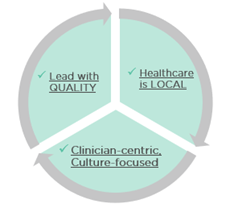New Harbor has reviewed partnerships with a multitude of medical practices across numerous specialties. Through this experience, three key considerations frequently rise to the top for practitioners: (1) access to resources, (2) clinical decision-making process, and (3) a groups’ prior experience. Alignment on all three is vital.
For New Harbor, three core tenets are used as guiding lights in providing clarity to each key consideration.
(1) Access to resources is critical to the delivery of healthcare. As a practitioner, it is important to have the ability to leverage modern technologies in bringing modern healthcare to patients. At New Harbor, access to resources is underpinned by our first core tenet: lead with quality. Our role is to support the evaluation and decision process of physician groups in determining when to invest in which resources. While no enterprise has unlimited capital, starting with the belief that quality prevails in the long run often results in agreement on and enablement of access to the right resources at the right time.
(2) For all healthcare practices, policies and workflows exist around clinical decision-making. In group practice settings, these policies are typically aimed at disseminating best practices through a dispersed footprint of locations. At New Harbor, our second core tenet is healthcare is local. Clinical decision-making should be determined by practitioners and structured for optimizing patient outcomes. A focus on local market excellence and reputation will enable high-quality clinical decision-making where practitioners feel empowered to leverage the benefits of a group practice.
(3) The last key consideration regards experience. It is a risky proposition for a practitioner to join an organization that s/he feels is unequipped and unprepared to support him/her in success. For New Harbor, experience is built through our third core tenet: clinician-centric, culture-focused organizations. The team that attracts the best clinicians creates a referenceable base of mentors for future clinicians. Great practitioners will attract other great practitioners and provide excellent patient care.
In our experience, if each core tenet is met, each key consideration follows, thus creating a self-sustaining flywheel of growth. At New Harbor, we have extensive experience partnering with physicians to enable positive practice growth while optimizing patient care. We believe in collaborations, not buy-outs, and elevating our business partners, not stifling them. Together, with an aligned business strategy, we aim to enable leading medical practitioners to provide top-tier care, thereby benefitting all stakeholders of their business. 
Whether you’re a physician practice owner looking to take the next step in scaling your business, or a local healthcare provider evaluating options and tools to better serve your community, the New Harbor Capital team welcomes the opportunity to connect to discuss your options! Email us at info@newharborcap.com to connect.
Share this post with your networks via the buttons below!
Source: https://www.ama-assn.org/press-center/press-releases/ama-analysis-shows-most-physicians-work-outside-private-practice
-1.jpeg)
